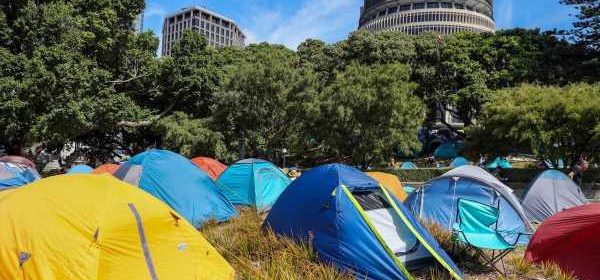Parliament protest: Wellington residents and businesses call for police action

Tempers in the capital are wearing thin as the anti-mandate protest at Parliament continues to grow and nears its third week.
Multiple reports over the past 12 days cite anti-social behaviour by protesters, including abusing passersby – among them children – for wearing masks, and surrounding streets and buildings have been overtaken by tents, campervans and cars.
The protest camp grew yesterday as a fresh convoy of cars – which began in Auckland – arrived in Wellington.
Wellington City councillor Rebecca Matthews told the Herald on Sunday police need to find a way to get the situation under control.
“I think that’s what Wellingtonians especially want to see: this whole thing contained and not growing.”
She said residents were “very scared” and people were reporting”more brazen” harassment that had extended through town.
“It seems to be happening in the direct presence of the police, and without any action being done to protect people.”
Despite protesters claiming they’re fighting for “freedom”, Matthews said Wellingtonians had less and less freedom because of the protest.
“We feel like the city isn’t ours anymore.”
She said wearing a mask to keep yourself and others safe had almost become a “marker” to get abused by the protesters.
“We want to see some more active policing, everybody supports the right to protest, we’re used to it in Welly, it’s part of our city, but we don’t think these people have a right to intimidate and harass Wellingtonians.
“Where are the police? We don’t want to be the collateral damage.”
In response, a police spokesperson told the Herald police recognise the ongoing impact from the protest, particularly onresidents in the central city and Thorndon area.
“Police have a significant presence in the area and [have] been visiting some residents, particularly those most affected by the protest.”
In a separate statement last night police said they had a team ready to respond to incidents outside the parliamentary precinct.
“Police are also noting the registration of vehicles currently impeding traffic for follow-up enforcement action.
“Police have attended at least six medical events within the protest and continue to urge anyone parked unlawfully to remove their vehicle and enable ready access to emergency services.”
On Friday, the country’s top police officer said negotiation and de-escalation were the only safe, and most desirable, ways to resolve the protest.
Yesterday police confirmed the number of people arriving at Parliament grounds to protest against Covid-19 vaccination mandates and a slew of other causes and grievances had increased.
Among the day’s activities was a Rhythm & Rights concert, organised by Destiny Church-aligned Freedom and Rights Coalition that included performances by Shane Walker, Dam Native, Sweet & Irie and DJ Raw.
Police had “serious concerns” around the health and safety of such an event, the statement said.
Wellington Mayor Andy Foster and leaders from the city’s business community have written to Finance Minister Grant Robertson and Small Business Minister Stuart Nash requesting urgent financial support as the Parliament protests roll through their second week.
“The pandemic is having a significant impact on Wellington businesses, some which are now on the brink of closure,” Foster said.
Foot traffic and spending in the central city was down 20 to 30 per cent since the end of last year.
Yesterday several cars were towed from Featherston St to clear the area for traffic.
Most cars, which were originally parked in the median lane, were reportedly removed by the owners peacefully. It appeared some vehicles had been parked in the middle of the busy road and police worked with Māori wardens to shift them.
Members of the protest security explained to the crowd that officers would be informing people where their cars have been taken.
Some members of the crowd shouted out “fair enough”, when security staff explained why the vehicles had to be removed.
A Hawke’s Bay couple, who wouldn’t be named, said the mandates hadn’t affected their jobs but they were concerned about the vaccine itself, claiming they had friends who were in hospital as a result.
“Why is the media not reporting that?”
According to Medsafe’s latest published safety report on January 31, there have been 51,710 adverse events following immunisation reports since the Pfizer vaccination programme began in New Zealand.
Of these, 2447 were considered serious and 49,263 non-serious.
More than 9.45 million doses of the Pfizer vaccine have been given in New Zealand.
“The protective benefits of vaccination against Covid-19 far outweigh the potential risks of vaccination,” Medsafe said.
Experts, such as Auckland University vaccinologist Dr Helen Petousis-Harris, have also backed the vaccine.
It had “absolutely been fast-tracked”.
“That is not because steps have been missed but because the layers of bureaucracy and restricted funding were removed virtually overnight and companies that normally compete with each other collaborated instead.
“The technology was already available.”
On Friday, Police Commissioner Andrew Coster said police wouldn’t take enforcement action against protesters despite the protest site growing by the day.
Most demonstrators were peaceful and protest groups had established some internal discipline, Coster said.
He also backtracked on an earlier pledge to start towing vehicles from occupied streets around Parliament, saying that would only escalate tensions.
“We needed to explore the option of that and test what the reaction would be. That approach would have been provocative and unhelpful.”
One resident told the Herald on Sunday that although they support the right to protest, it was sad the university had to close for eight weeks, and the impact it has had on some businesses and commuters.
Source: Read Full Article

/cloudfront-ap-southeast-2.images.arcpublishing.com/nzme/X3U3AI4Y6UY7M33CS6AHPAMS6I.jpg)
/cloudfront-ap-southeast-2.images.arcpublishing.com/nzme/3FBT34C2VNC3Q6MHF6EE2ESVKU.jpg)
/cloudfront-ap-southeast-2.images.arcpublishing.com/nzme/FD2CWHSIEVKXUECPWIJOGAL5LE.jpg)